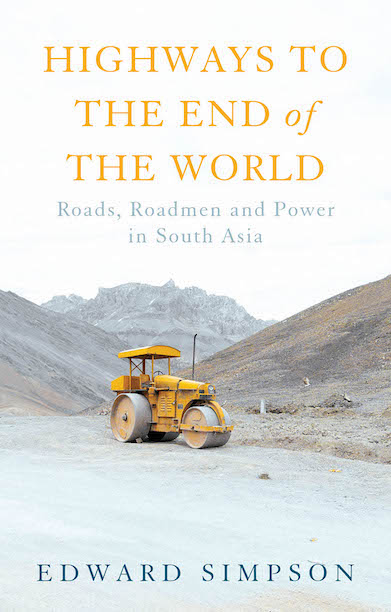The Political Biography of an Earthquake
Aftermath and Amnesia in Gujarat, India
‘A magnificent account of the spaces for memory work and political contestation that are opened up in the wake of an apparently “natural” traumatic event. Simpson’s prose is taut and often beautiful, his major observations profound and sometimes haunting. All in all, this is a great achievement and a major work of anthropology.’ — Stuart Corbridge, Provost of the London School of Economics
Description
For those so-minded, the aftermath of an earthquake presents opportunities to intervene. Thus, in Gujarat, following the disaster of 2001, leaders were deposed, proletariats created, religious fundamentalism incubated, the state restructured, and industrial capitalism expanded exponentially.
Rather than gazing in at those struggling in the ruins, as is commonplace in the literature, this book looks out from the affected region at those who came to intervene. Based on extensive research amid the dust and noise of reconstruction, the author focuses on the survivors and their interactions with death, history, and with those who came to use the shock of disaster to change the order of things.
Edward Simpson takes us deep into the experience of surviving a ‘natural’ disaster. We see a society in mourning, further alienated by manufactured conditions of uncertainty and absurdity. We witness arguments about the past. What was important? What should be preserved? Was modernisation the cause of the disaster or the antidote?
As people were putting things back together, they also knew that future earthquakes were inevitable. How did they learn to live with this terrible truth? How have people in other times and places come to terms with the promise of another earthquake, knowing that things will fall apart again?
Table of contents
Acknowledgements
Notes on the region
Introduction
Section 1: Chai wallahs and the carpetbagger
1. Sublime
2. Retrospective anatomy
3. Aftermath epistemology
4. Hyperbolic capitalism
5. The carpetbagger
6. Notes on ‘aftermath’
Section 2: Earthquake politics
7. Regime change
8. View from the east
9. Borderlands
10. (Re)birth of an icon
Section 3: Villages
11. Village ‘adoption’
12. Service
13. Jihadi, dog and secularist
14. Building politics
15. Integral Humanism
Section 4: The seven crows
16. The place of Bhuj
17. Where to start?
18. Planners
19. G numbers
20. The unbearable intensity of reduction
Section 5: The work of mourning
21. Nostalgia
22. History making
23. Rituals of reconstruction
24. Umashankar’s great escape
25. Slow death
26. Values of citizenship
Section 6: Hope
27. All is good?
28. Explanation
29. Inhabitation
Section 7: Amnesia
30. Shocks of colonialism
31. Earthquake diaspora
32. Nehru’s village (twice)
33. Planning to forget
34. Memory
Afterword
Index
Reviews
‘In his Political Biography of an Earthquake … Edward Simpson tries to pull back from the immediate, ephemeral spotlight so typical of journalists, politicians and international humanitarian agencies. … Without reverting to excessive theory, Simpson explores the history of the most affected district of Kutch and investigates the consequences of the relief efforts of 2001. In these efforts, he sees – for good or evil – an underlying neoliberal capitalist agenda, with industrialisation, immigration and environmental degradation accelerated if not caused by the reconstruction efforts. Simpson provocatively suggests the need for an alternative view of “humanitarians” as trespassers, “their actions no longer … so routinely sensible or so morally untouchable”. … his many years of research in the region provide important material for reflection beyond the usual focus on local government failure and the need to accelerate foreign help after disasters’ — The Financial Times
‘Anyone interested in the future direction of India and its economy will find considerable food for thought in The Political Biography of an Earthquake.’ – Andrew Robinson, The Journal of the Royal Asiatic Society
‘Simpson’s book not only does justice to Gujarat after the calamity but provides a comprehensive idea of how a narrative of a disaster can be presented in a non-sensational and non-academic manner.’ — Dawn
‘Edward Simpson’s book places the earthquake and its aftermath firmly within the political context of Gujarat. It is not simply an account of the social consequences of a natural disaster but a compelling political ethnography of Gujarat, through the lens of the earthquake. Offering a multilayered political analysis the book however never gives up deep humane concern for individual struggles and experiences.’ — Martin Sökefeld, Chair of Social and Cultural Anthropology, Ludwig Maximilian University of Munich
‘The Political Biography of an Earthquake is a magnificent account of the spaces for memory work and political contestation that are opened up in the wake of an apparently “natural” traumatic event. Simpson’s prose is taut and often beautiful, his major observations profound and sometimes haunting. All in all, this is a great achievement and a major work of anthropology.’ — Stuart Corbridge, Provost of the London School of Economics
‘The idea of looking at a natural disaster through its political biography redefines our understanding of both politics and nature. Carefully researched, cogently argued, this book will not only deepen how we read the politics of Gujarat but also how we conceptualise the relation between governance, politics and natural disasters.’ — Veena Das, Krieger-Eisenhower Professor of Anthropology, Johns Hopkins University
‘Simpson provides one of the few full-length ethnographic studies of an earthquake — this one in Gujarat, India. He richly details the local, regional, and global political factors that shape the post-earthquake period. Readers will be convinced that a so-called natural disaster is never just simply natural.’ — Barbara Miller, Professor of Anthropology and International Affairs, George Washington University
Author(s)
Edward Simpson is Professor of Social Anthropology at SOAS University of London, and Director of the SOAS South Asia Institute. He is the author of The Political Biography of an Earthquake: Aftermath and Amnesia in Gujarat, India (also published by Hurst); and Muslim Society and the Western Indian Ocean.



